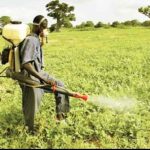
By Felicia Imohimi
The Alliance for Action on Pesticide in Nigeria (AAPN) has called on the Nigerian government to develop pesticide policy and legislation to ensure toxic pesticides are prohibited and reduced in usage.
AAPN made the call in a communiqu issued on Wednesday at the end of a one-day documentary screening and panel discussion on pesticide double standards and improving pesticide regulation in the country.
The communiqu was signed by Donald Ofeogbu, Coordinator of AAPN, Programme Manager HBS and Chris Kaka, Coordinator AAPN Programme Manager Trade Network Initiative (TNI).
The News Agency of Nigeria (NAN) reports that the goal of the meeting is to end the double standards that exist in the global trade in pesticides active ingredients and products.
Pesticide products and active ingredients not approved in the European Union (EU) due to health or environmental concerns but exported out of EU by agrochemical corporations are sold in other regions, including Nigeria.
It was to also encourage sustainable agricultural practices and to stop supporting conventional monoculture that furthers the dependence on hazardous pesticides and to fill gaps in regulations and management of pesticides.
In the communiqu, AAPN observed that there was no pesticide policy or legislation in Nigeria that effectively regulate the use and entry of pesticides, especially those banned elsewhere and Highly Hazardous Pesticides (HHPs).
It said there were also large and confusing overlaps in pesticide supervision in the country between the Federal Ministry of Agriculture and Rural Development (FMARD), Ministry of Environment, NESREA, NAFDAC among others with related mandates.
These agencies all seem to be struggling for dominance instead of working in synergy.
The companies producing pesticides claim that their products are safe if they are used correctly, and marketing approval is based on the supposition of safe use.
This statement however is very far from the reality in Nigeria and other countries of the Global South.
In many cases, the necessary protective equipment is unavailable, too expensive, or impractical due to the climatic conditions. Many farmers in Nigeria are not aware of the effects, it added.
The communiqu recommended that House of Representatives Committee on Agriculture should continually open up the space for public participation and engagement in the development of pesticide legislation.
The committee should ensure that any legislation on pesticides is first in the interest of safeguarding the health of Nigerians and our environment, rather than maximising the profits of agro companies.
The National Assembly and the Presidency should approve budgetary provisions to fund the meetings of the National Chemical Management Committee to improve inter-ministerial collaborations to end the poor management of HHPs and other highly toxic chemicals across the sectors.
The Federal Ministry of Agriculture and Rural Development should work closely with the Nigeria Agricultural Quarantine Service (NAQS) towards opening the draft and review process of the Integrated Pest Management Policy Plan (formally headed by NASQ), it recommended.
It further recommended that government should ensure that CSOs, smallholder famers, consumer groups, academia and organic practitioners are part of the process of developing the policy.
It also recommended that farmers associations and farmers clusters should work towards self-regulation on the pesticide usage among their members and increase the awareness on highly hazardous pesticide brand among their members.
According to the communiqu, farmers should have a list of pesticides that are unlikely to cause any acute hazard.
They should encourage and demand for organic pesticides, bio-pesticides, while also supporting their members to learn more sustainable, healthy farm systems like multi-cropping systems, organic farming, agro-ecology, use of land preparation strategies and mechanical for weed control.
Farmers at all levels should mobilise and seize the opportunity of forthcoming national election to engage with political candidates on the spread of toxic pesticides, and secure political commitments to promote nature friendly bio-pesticides.
They should as well seek for improvement of pesticide regulation in Nigeria and the promotion of sustainable agriculture.
Politicians, farmers and electorates should refrain from the offer and acceptance of highly hazardous pesticides.
NAN reports that AAPN is a coalition of over 40 civil society organisations, academia, independent scientists and media professionals, who are committed to phasing out all Highly Hazardous Pesticides (HHPs), obsolete and adulterated pesticides from Nigeria and West Africa.
The event was attended by over 95 physical participants and 45 online participants, including representatives FMARD, Ministries ofHealth, Industry, Trade and Investment, Environment, Budget and National Planning, Office of the Secretary General of the Federation and the media.
Others included: NESREA, NAFDAC, FCCPC, Nigeria Customs Services, SON, NAQS, NASS members in agricultural production and services, International and local NGOs, CSOs, Pesticide Action Network Europe, HBS Brussels Office, Third Circle Kenya, Action Aid Nigeria and farmers associations and others. (NAN)(www.nannews.ng)
Edited by Grace Yussuf
Source: NAN News